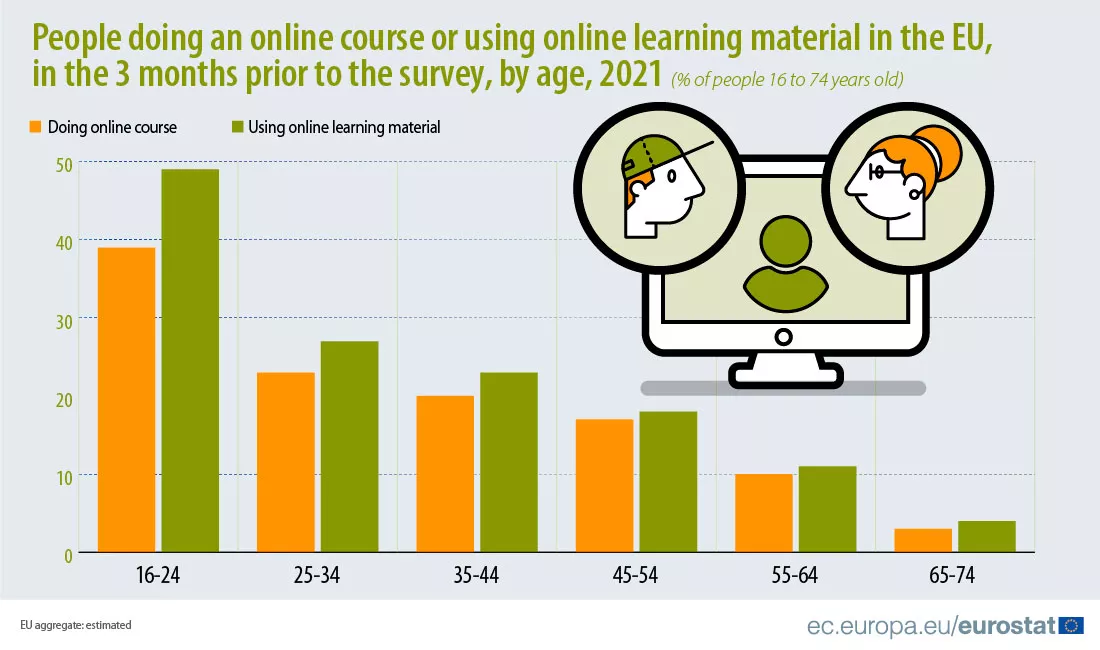Self-paced learning in the time of global access

In the last 10 years, we have witnessed a progressive and global shift in the paradigm of learning formats, through the development of global, European, and national platforms whose main aim is to publish learning content online, modular, and often free. From the launch of the first Massive Online Open Courses in the first decade of this century, available non-formal learning resources online have seen a constant increase and expansions in terms of platforms, courses at all levels of education, topics, training providers and several participants registering for such offer.
According to Class Central, an online course aggregator that collects info from thousands of training providers, their catalogue contains 150,000 courses on more than 1,450 subjects (data extracted on 3/07/2023) and their insightful annual MOOC Stats and Trends states that ‘’In 2021, 10 years after it burst on the scene, the MOOC ecosystem has reached 220M learners and 19.4K courses’’ (Source: A Decade of MOOCs: A Review of MOOC Stats and Trends in 2021, Dhawal Shah, Class Central, 2021).
However, this considerable growth in offer and general participation is unfortunately not seeing a parallel increase in access to such opportunities by adult learners.
Supporting adult learners needs more than just flexibility of the offer
According to the Community survey on ICT usage in households and by individuals 2022, ‘’In 2021, 39% of young people reported doing an online course and 49% used online learning material, compared with 23% and 27% among adults aged 25 to 34, and 20% and 23% among adults aged 35 to 44. The shares continue on a downward trend as age increases, hitting the lowest point among older people (aged 65 to 74), where 3% did an online course and 4% used online learning material.’’ (Source: Interest in online education grows in the EU, Eurostat, 24 January 2022).

As for the potential causes, tangible and contextual barriers to adult learning still have considerable impact, for example, the digital divide, which is still a major challenge globally, as also remarked in a recent UNESCO paper, (Source: Short courses, micro-credentials, and flexible learning pathways: a blueprint for policy development and action: policy paper, Martin, Michaela, and Van der Hijden, Peter, UNESCO 2023). Other well-known challenges are time, logistics and financial support.
These challenges are being addressed by a variety of measures and actions, at the national and European levels, in terms of policies and strategies and, slowly, also in terms of implementation, for example with the uptake of micro-credentials and individual financial support. As per the digital divide, many providers are also trying to address it, such as Coursera and Kiron Digital Learning Solutions whose courses settings can be adjusted to the learners’ technical solutions, as reported by the same UNESCO paper.
The Learning Competence Divide requires a systemic approach
While tangible barriers constitute still major challenges, offers seem progressively more flexible, and still, the uptake of self-paced and micro-learning for adult learners is far from ideal. Flexibility and tangible accessibility of learning opportunities (modular courses, financial support, free online content, simplified technical solutions etc.) are the first step and have a crucial role, while they represent only one face of the medal.
Flexible education systems need also to integrate and be integrated with systemic support to adults in terms of information, guidance, tutoring and mentoring, by public services, companies, workers’, and civil society organizations. In this direction, the mentioned UNESCO paper also identifies the main challenges for making micro-learning impactful and it suggests possible actions:
-
professionally supporting learners in composing coherent learning pathways;
-
online learning platforms embedding features helping learners to identify relevant learning contents;
-
and positive collaboration and feedback cycle between learners, learning providers and employers on the value of micro-learning.
However, much needs to be done also in terms of the learning competence divide for adults’ learners. A considerable amount of intrinsic motivation together with the capacity to self-design and manage own learning paths are required to handle an autonomous learning process, in the absence of fixed schedules and of continuous support by tutors and peers.
Learning literacy as model for sustainability of lifelong learning
Self-paced, micro-learning and online learning requires a good level of the managing learning competence that must be fostered as fundamental competence across systems (education, employment, and community).
The LifeComp framework defines this competence as "The planning, organising, monitoring and reviewing of one’s own learning".
And the same report deepens the concept and explains the complexity of the learning process:
"Adopting a lifelong attitude towards learning requires developing self-regulatory skills. Self-regulated learning involves metacognitive, motivational, and behavioural processes that are personally initiated to acquire knowledge and skill, such as goal setting, planning, learning strategies, self-reinforcement, self-recording, and self-instruction’’. (Source: Sala, A., Punie, Y., Garkov, V. and Cabrera Giraldez, M., LifeComp: The European Framework for Personal, Social and Learning to Learn Key Competence, EUR 30246 EN, Publications Office of the European Union, Luxembourg, 2020).
In a mature approach to lifelong learning for all, focusing on learning literacy can become a model of sustainability for an integrated education and employment system that caters for the needs of society (community and labour market) as well as the needs of individuals in terms of self-determination and autonomy to design their own paths. Learning literacy must be also included in the assessment of transversal competences.
The ALE sector at national, European and international level has a main role to play in making sure that learning literacy is and continue to be a core aspect in all education programs, no matter the level and the format, to guarantee that all citizens can leverage fully the available and growing education offer.
Related Resources on EPALE
Comments
Egyetértek azzal, hogy a …
Egyetértek azzal, hogy a “állami szolgálatok, vállalatok, munkavállalói és civil társadalmi szervezetek által végzett rendszerszerű támogatásának a rugalmas oktatási rendszerek szerves részét kell képezniük”, És bízom benne, hogy ahogy hallottuk az Epale híradóban szeptember 4-én, bár a tagállamok közül sokan küzdenek a megvalósítással, egyre több gyakorlati eredményt mutat hatunk fel a mentorálás terén is, rendszer szinten.
Piekrītu, par veiksmīgu…
Piekrītu, par veiksmīgu pieredzi saistībā ar Valsts izglītības un attīstības aģentūras programmu mācībām pieaugušajiem, kas tiek īstenotas ESF projekta "Nodarbināto personu profesionālās kompetences pilnveide" ietvaros. Tā kā mācības nav lēts prieks, tad domāju, ka finansiāls atbalsts bija daudzu cilvēku motivators izmantot šo mācīšanās iespēju, tādējādi apgūstot sev interesējošus kursus un iegūstot jaunas kompetences.
Kursi kopā ar pasniedzēju noteikti ir vienkāršāk īstenojami nekā kursi, kuri tiek apgūti pašmācības ceļā, klausoties lekciju ierakstus vai pildot uzdevumus, jo ir jābūt ārkārtīgi lielai motivācijai un vēlmei, lai to darītu. Kā arī var pietrūkt struktūras un atgriezeniskās saites, ko var sniegt pasniedzējs.
Tomēr ļoti pozitīvi vērtēju daudzās iespējas mācīties, kas mūsdienās ir neatņemama dzīves sastāvdaļa, jo viss attīstās un mainās ļoti strauji un mums tam ir jāpielāgojas.
Piekrītu, ka pašmācības ceļā…
Piekrītu, ka pašmācības ceļā apgūstot mācību vielu, jābūt ļoti lielai motivācijai. Tāpat brīžam var pietrūkt pasniedzēja norādes, savstarpējā komunikācija.
Īsāki kursi var būt ļoti labi pašmācībā, bet kursi, kas norisinās pusgadu vai ilgāk var būt ļoti izaicinoši, visdrīzāk ar lielu skaitu kursu nepabeigušo.
Holistic Approach
I totally agree a holistic approach is required. One size does not fit all and a flexible range of learning pathways and supports are required.
Piekrītu raksta autorei…
Piekrītu raksta autorei Agnesei Zarānei, ka pieaugušo izglītības pieejamībai ir būtiska saistība ar digitālo pratību. Atveseļošanās fonda ietvaros Latvijā būtiski resursi ir paredzēti digitālo prasmju veidošanai, stiprinot ne tikai digitālās prasmes privāto sektoru, zinātnisko institūciju un augstskolu personālam, bet arī senioriem un ekonomiski mazāk aizsargātiem Latvijas iedzīvotājiem. Var secināt, ka minētais finansiālais atbalsts digitālo prasmju paaugstināšanai ir nozīmīgs instruments pieaugušo izglītības pieejamības un sekmīgas ieviešanas kontekstā. Piekrītu arī raksta autores minētajam, ka programmu sekmīga ieviešana, domājot, vai izvēlētā mūžizglītības programma tiek pabeigta, paaugstinot kvalifikāciju, ir personas motivācijai. Vērtēju kā veiksmīgu pieredzi Valsts izglītības un attīstības aģentūras programmu mācības pieaugušajiem, kas tiek īstenotas ESF projekta "Nodarbināto personu profesionālās kompetences pilnveide" ietvaros un kur personai ir jāveic 10% līdzmaksājums, tādejādi palielinot atbildību par savu ieguldījumu un izsverot savu motivāciju. Jāmin, ka arī šajā programmā būtisks uzsvars ir mācību programmu atbalstam, kas veicina digitālo prasmju attīstību ar dažādiem priekšzināšanu līmeņiem.
Pašapmācība vai tomēr attālināta mācīšanās
Interesanta tēma, kas specifiski aktualizējās un strauji pilnveidojās pandēmijas laikā. Ar pozitīvām un negatīvām iezīmē. Sākotnēji attālinātais process bija jauns un iepriekš tik maz pieredzēts, kas radīja spēcīgu sašutumu, kā pilnvērtīgi apgūt tēmu.
Manuprāt, joprojām attālināts mācību process jeb šajā gadījumā pašmācības, nekad nevarēs būt tik pilnvērtīgas kā tas ir ar pasniedzēju. Kaut arī pašu plānotas lekciju apguves, kā to piedāvātu priekš mūžizglītības ir ērti un viegli pielāgot savam ikdienas grafikam, tomēr tas nenodrošina tik labu komunikāciju savā starpā un informācijas uztveri.
Pašmācīšanās
Noteikti ir svarīgs arī vecums , un ar to saistītā mācīšanās pieredze.





Piekrītu
Nenoliedzama ir digitālā plaisa un citi šķēršļi pieaugušo izglītībā, it īpaši vecumā no 65 līdz 74 gadiem, kur tikai 3% ir apmeklējuši tiešsaistes kursus, un ka digitālās prasmes un piekļuve tehnoloģijām ir kļuvušas par būtisku šķērsli. Nenoliedzams ir fakts, ka elastīgām izglītības sistēmām ir jāintegrē sistēmisks atbalsts, iesaistot valsts dienestus, uzņēmumus un pilsoniskās sabiedrības organizācijas.
Jāpiekrīt, ka svarīgs aspekts ir pašmācības un mikroapmācību ieviešana pieaugušajiem, bet ka ar to vien nepietiek. Nepieciešama arī iekšējā motivācija un spēja pašiem vadīt savu mācību procesu, ka mācīšanās prasme ir būtiska ilgtspējīgas integrētas izglītības un nodarbinātības sistēmas sastāvdaļa, un prasmes mācīties ir jāiekļauj transversālo kompetenču novērtējumā. Ka nepieciešama sistēmiska pieeja pieaugušo izglītībai, kas apvieno tehnoloģiskās inovācijas ar sociālajiem un individuālajiem aspektiem, lai nodrošinātu, ka izglītība ir pieejama un pielāgota visām vecuma grupām.